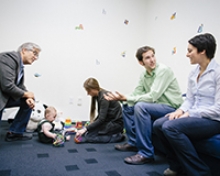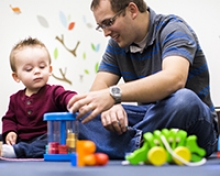Researchers Dispel Child Development Myths at Symposium
When it comes to child development and education, separating fact from fiction is critical for professionals in the field. More than 65 educators and care providers benefited from the expertise of UC Merced faculty members March 14 during the university’s second annual Symposium on the Child and Family.
Hosted on campus and sponsored by the Gateway Association for the Education of Young Children, the Merced County Local Child Care and  Development Planning Council and the UC Merced Early Childhood Education Center (ECEC), the symposium featured research presentations from cognitive science, health psychology and developmental psychology professors.
Development Planning Council and the UC Merced Early Childhood Education Center (ECEC), the symposium featured research presentations from cognitive science, health psychology and developmental psychology professors.
Professor Jeffrey Gilger kicked off the event with an overview of the myths and realities about what causes learning disabilities. Addressing everything from biochemical imbalances and economics to brain dysfunction and environment, Gilger tackled each potential cause from a fact-based perspective.
“I’m not saying a special diet hasn’t helped one or two kids at some point — there are exceptions to every rule,” he told the audience. “But there is no research that supports the idea that any learning disability can be cured through diet alone.”
Brain dysfunction, genetics, environment and exposure to toxins are among the causes of learning disabilities that are supported by scientific research, Gilger said. And while many of the causes are unavoidable, children with learning disabilities can still be helped.
“Parents and teachers can help children by finding their strengths and encouraging growth in those areas while using research-based interventions as early as possible to help the kids learn to compensate for their challenges,” he said.
Professors discuss autism spectrum disorder
Professors Eric Walle and Anne Warlaumont talked at length about autism spectrum disorder (ASD). Children with autism have a difficult time with joint attention and affect responding, meaning they struggle to communicate effectively with others over a shared point of focus and have a hard time understanding emotional cues or socially interacting with others.
Walle, a developmental psychologist, said the top problem with autism right now is that it’s not diagnosed early enough. Res earch has shown most people with ASD had clear indicators by the age of 1, but children typically are not assessed or diagnosed until the age of 3 or 4.
earch has shown most people with ASD had clear indicators by the age of 1, but children typically are not assessed or diagnosed until the age of 3 or 4.
“No intervention method works for everyone; it takes time to figure out each child,” Walle said.” By waiting so long to diagnose children with ASD, we’re missing a valuable window of opportunity for treatment.”
Warlaumont, a cognitive scientist, has used daylong audio recording to document how autistic children’s natural social environments support language learning. The devices she employed are also being used in studies to research the effectiveness of various large-scale intervention projects, she said.
Early bilingualism benefits, family dynamics highlighted
Other highlights from the symposium included Professor Rose Scott speaking on the potential benefits of early bilingualism in children, Professor Deborah Wiebe’s presentation on how family dynamics affect disease management for children with chronic illnesses, and an exploration of how positive communication techniques can reduce the amount of tension in families during adolescence, by Professor Alexandra Main.
Poster presentations during lunch gave attendees the opportunity to find out about other studies conducted by UC Merced faculty and student researchers, and to ask questions in an informal setting.
Paula Floro, a teacher at Thomas Olaeta Elementary School in Atwater, was a first-time attendee who said she looks forward to attending the next symposium.
“Dr. Walle suggested some valuable strategies for the autistic children in my classroom that I plan to implement,” she said. Based on Floro’s recommendation, her principal has arranged for Walle to present his talk during a teacher training at the school.
The event proved educational for the researchers, as well.
“Part of why we are here today is to hear from you,” Walle told the audience. “You live life with these children every day. We rely on your experiences and observations to inform the research we do.”
